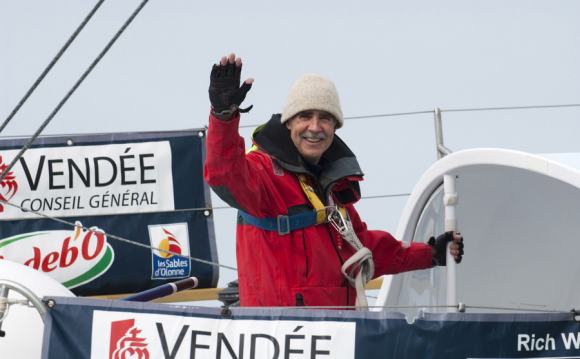
Crossing the finish line off Les Sables d’Olonne at 12h 43 19s GMT Rich Wilson completed the 24,840 mile Vendée Globe solo non stop round the world race in ninth place, completing a highly creditable result which is testament to his excellent seamanship skills, deep determination, careful planning and prudent execution, staying the distance to finish this incredible edition of the race which has claimed the highest attrition rate yet. Wilson finished 121 days 00 hours, 41 minutes and 19 seconds after leaving Les Sables d’Olonne on Sunday November 9th. Wilson averaged 9.84 knots on the water covering 28,590 miles. He sailed the 24,840 theoretical miles at an average speed of 8.55 knots.
While nineteen of the 30 skippers who started from the Vendée start line on November 9th had to retire from the race, the most gruelling challenge in solo ocean racing, Wilson, the race’s senior skipper at 58 years old, has stuck rigidly to his watchwords of safety and conservatism, showing huge determination to complete the course as the pinnacle of a sailing career which already included three ocean passage records.
Sailing Great American III, which was built in 1999 to a design by Bernard Nivelt for Thierry Dubois, Wilson, of Marblehead, MASS, becomes only the second American ever to finish the Vendée Globe after Bruce Schwab finished ninth from 20 starters in the 2004-5 race on his Ocean Planet.
Wilson safely completed his boat’s third circumnavigation after Dubois sailed her in the 2000-1 Vendée Globe and then the 2002 Around Alone.
While his first race into the inhospitable wastes of the Southern Oceans proved the biggest physical challenge for Wilson, his weeks since rounding Cape Horn have tested his mental durability. In the South Atlantic he struggled with constant headwinds and occasional difficult low pressure systems which generated strong winds and confuses seas and the complex weather pattern in the North Atlantic meant he had to make detours of nearly 1000 miles to get west around successive high pressure systems.
At one point in the middle of the Atlantic he was nearly 500 miles closer to his home in Boston than he was to the finish. His race has been more limited to a test of stamina since the south of Australia and New Zealand when his nearest rivals, first Canadian Derek Hatfield (Algimouss Spirit of Canada) and then Jonny Malbon (Artemis) retired successively with rigging damage and with mainsail damage respectively. That left Wilson feeling more isolated with his next nearest rivals 1000 miles ahead and astern.
His finish is a great triumph for the amateur solo skipper whose career has progressed steadily, regularly proving that he has the steel and the skill to take on big challenges. In 1980 he was the youngest skipper to win overall in the Newport-Bermuda Race on
Holger Danske. Between 1993 and 2003 on his 50 foot trimaran Great American II he set world records on clipper routes. In 1993 he set a record for San Francisco to Boston of 69 days 20 hours. In 2001 he sailed from New York to Melbourne in 68 days and 10 hours and in 2003 he sailed from Hong Kong to New York in 72 days and 21 hours before competing in the 2004 Transat in which he finished second in class 2. Since moving to the IMOCA Open 60 Great American III, Wilson completed two Transatlantic races, the two handed Transat Jacques Vabre in 2007 and the return solo race the BtoB from Brasil to France.
In a field which is mainly populated by die-hard professional solo skippers, Wilson stands out with a long academic, teaching, consultancy and investment career which has run successfully alongside his sailing programmes. He has three university and college degrees from Harvard, from MIT, and Harvard Business School. He was a policy adviser to the Democrat party, a popular maths teacher in his native Boston, a desalination consultant in Saudi Arabia as well as a successful private business investor. In 1990 he created the sitesAlive foundation and has since developed hugely popular learning programmes on the internet and in newspapers, engaging young people of all ages with his adventures. Along with a team of experts he enlightens with practical presentations of topics from simple science and geography to more complex topics. During the Vendée Globe he has had hundreds of syndicated articles and essays published in more than a dozen different newspapers.
He has also been an inspiration to asthma sufferers all over the globe. Afflicted since the age of one, he went on to run the Boston marathon in 1982 and has takes four daily medications to keep his asthma under control.